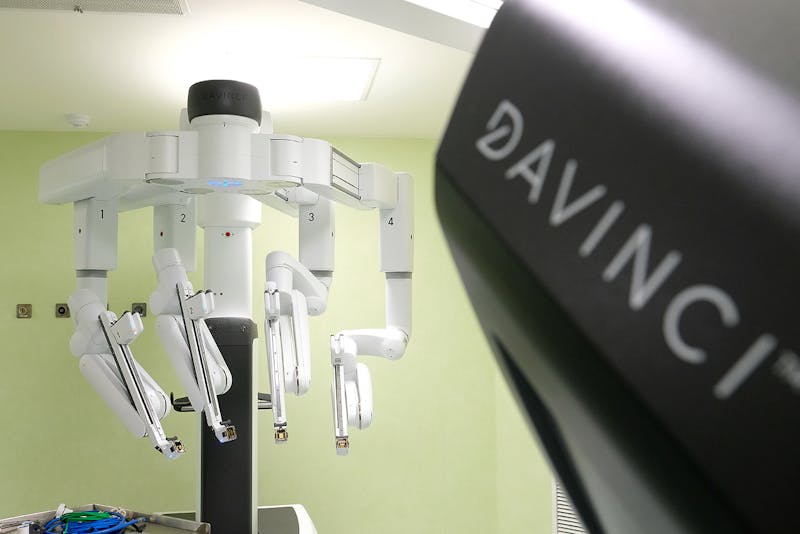• The system allows for more concise surgery, with reduced bleeding and less risk of infection after surgery, enhancing patient safety and faster recovery, which implies a lower cost to the health system.
• With a three-dimensional view of the surgical field and four arms that increase the surgeon’s control of movements, it is indicated for addressing more than 90 indications from 6 different specialties.
• The new robot joins the already advanced technological equipment of the HM Hospitales reference center in Catalonia, which includes the integrated Neuroscience operating room, the 3 Tesla Magnetic Resonance, the latest generation PET-CT, and the EOS® vertical scanner, in addition to the provision of the renovated ICU.
HM Nou Delfos Hospital continues its path towards specialization in the approach to high-complexity pathologies and incorporates the Da Vinci robotic system into its already advanced technological equipment. Thus, the HM Hospitales reference center in Barcelona consolidates itself as one of the hospitals with the best technological equipment in Catalonia.
The use of the Da Vinci platform, a benchmark in minimally invasive robotic surgery, will allow improving the precision and safety of surgical interventions in six specialties while favoring the prompt recovery of the patient, reducing hospital stays, and thereby costs to the health system.
Minimally invasive robotic surgery is characterized by being carried out with Da Vinci technology, which allows the surgeon to manually control the commands of the console located in the operating room, accurately transforming the gestures into the movements of the robotic arms. In this way, numerous clinical advantages for the patient are achieved before, during, and after surgery, such as a reduction in bleeding and a lower risk of infection, which enhances their safety and recovery. In this regard, the medical director of HM Nou Delfos, Dr. Julio García Prieto, assures that “the use of the Da Vinci robot allows the surgeon to work with smaller incisions, which leads to better aesthetic results. Moreover, and even more importantly, it concentrates the execution of all movements and force on a specific point, minimizing the pressure on the abdominal wall and the consequent trauma to the tissues, so the patient suffers less postoperative pain and reduces the time of hospital stay. There is also a lesser need for transfusions or re-interventions, which entails a lower economic cost for the health system”.
Advantages for the Surgeon
However, the patient is not the only beneficiary of the Da Vinci technology; the surgeon also finds their work greatly facilitated. It features a 3D vision system that magnifies reality by ten times, enhancing sharpness and image quality compared to other laparoscopic surgery devices. It also provides a threedimensional view of the surgical field. Additionally, it has four robotic arms that are controlled from a single console and a system that filters out tremors and involuntary hand movements of the surgeon, contributing to greater precision in the approach.
Another advantage of the Da Vinci robotic surgery system for the specialist is that “it makes it possible to perform multi-quadrant surgery, that is, to carry out more complex interventions on organs located in different quadrants, without having to change the position of the robot or the patient,” explains Dr. García Prieto.
The new Da Vinci robot at HM Nou Delfos belongs to the latest generation available of this technology and digitalizes the intervention, allowing data such as surgical times, materials used, etc., to be stored for later analysis with the aim of optimizing resources.
This innovative robotic surgery system is indicated for adressing more than 90 indications from 6 different specialties: Urology, Gynecology, Otorhinolaryngology, General Surgery, Thoracic Surgery and Pediatric Surgery.
The new Da Vinci robot adds to the already advanced technological equipment at HM Nou Delfos Hospital. Since the arrival of HM Hospitales, there has been a profound renovation of the technology with a commitment to incorporating the most advanced machinery. Today, the hospital boasts a Surgical Block configured by 11 operating rooms where practically all high-complexity surgical interventions are performed, particularly notable in Neurosurgery, Cardiac Surgery, Thoracic Surgery, and Oncologic Surgery, as two of them have integrated direct and real-time visualization of different imaging platforms that support the surgical team’s on-site decisions.
The integrated operating room in Neurosciences is particularly significant, whose technological equipment makes it unique in private Catalan healthcare. In this regard, it has a highly versatile mobile intraoperative CT scanner, an intraoperative monitoring system capable of obtaining “online” information every 5 seconds on how the patient tolerates the surgical maneuvers, and neuronavigators, which increase the surgeon’s precision by facilitating the tracking of the operation’s progress.
Moreover, HM Nou Delfos features an EOS® vertical scanner, which emits 85% less radiation and can obtain an image in less than 15 seconds; the 3 Tesla Magnetic Resonance; the Mammography with 3D Tomosynthesis; the PET-CT; the 160-slice CT scanner; and the Novadaq Tower, which applies augmented reality in surgery through fluorescence technology.
An Innovative ICU
Finally, the renovated ICU consists of boxes equipped with negative pressure to keep non-contaminated areas safe and includes equipment for invasive and noninvasive cardiac and neurological monitoring, ventilators, devices for continuous extrarenal purification techniques, latest-generation drug infusion pumps, and articulated beds that allow for the seated position, with a scale and a box to perform conventional radiology without needing to move the patient. They also have WiFi connectivity to facilitate communication for patients who cannot receive visitors.
Since last March, HM Nou Delfos Hospital has activated the 24-hour stroke code, which allows improving the treatment and recovery of patients with a multidisciplinary response in the hours following a stroke.
The regional director of HM Hospitales in Catalonia, Dr. Lidón Milla, states that the incorporation of the Da Vinci robotic surgery system represents “the consolidation of HM Nou Delfos as a reference hospital in the care and approach of high complexity” and adds that “it will not be the only novelty this year, as it is also planned to acquire another robot, this one dedicated to knee and hip surgery, and to offer more innovative services to the patient. The Group plans to invest 3 million euros throughout 2024, adding to the 120 million invested since 2018.“

